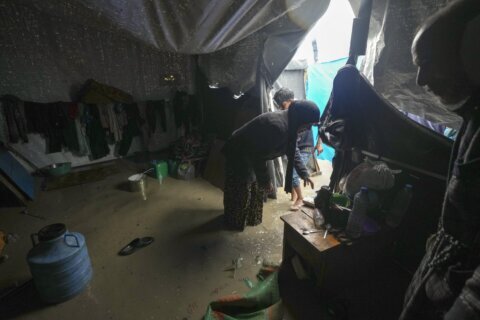YEREVAN, Armenia (AP) — Azerbaijan said it arrested the former head of Nagorno-Karabakh’s separatist government as he tried to cross into Armenia on Wednesday along with tens of thousands of others who have fled following Azerbaijan’s 24-hour blitz last week to reclaim control of the enclave.
The arrest of Ruben Vardanyan was announced by Azerbaijan’s border guard service. It appears to reflect Azerbaijan’s intention to quickly and forcefully enforce its grip on the region after the military offensive that has prompted a rapid exodus of ethnic Armenians.
Vardanyan, a billionaire businessman who made his fortune in Russia where he owned a major investment bank, moved to Nagorno-Karabakh in 2022 and served as the head the regional government for several months before stepping down earlier this year.
The border guard service said Vardanyan was escorted to Azerbaijan’s’s capital, Baku, and handed over to “relevant state bodies” that will decide his fate. It posted a picture of Vardanyan held by two border guards next to a helicopter.
Also Wednesday, Azerbaijan’s Health Ministry said a total of 192 Azerbaijani troops were killed and 511 wounded during the offensive in Nagorno-Karabakh. One Azeri civilian also died in the hostilities, the ministry said.
Nagorno-Karabakh officials said earlier that at least 200 people on their side, including 10 civilians, were killed and over 400 were wounded in the fighting.
The 24-hour Azerbaijani blitz involving heavy artillery, rocket launchers and drones forced the separatist authorities to agree to lay down weapons and sit down for talks on Nagorno-Karabakh’s “reintegration” into Azerbaijan.
Azerbaijan and separatist officials have since held two rounds of talks, but no details have been made available and prospects of “reintegration” of Nagorno-Karabakh’s ethnic Armenian population into the mostly Muslim country have remained unclear.
Despite Azerbaijan’s promises to respect the rights of the region’s residents, they have rushed to flee the region en masse fearing reprisals.
More than 53,000 people, or about 45% of Nagorno-Karabakh’s population of 120,000, had left the region for Armenia as of nightfall Wednesday, according to Armenian authorities.
Stepanakert, the region’s capital, looked deserted Wednesday as remaining residents who don’t have their own vehicles to leave the city gathered in the center, waiting for buses promised by the authorities. A horse and a donkey, apparently left behind by former owners, could be seen slowly walking together along an empty street.
Hours-long traffic jams were reported on Tuesday on the road out of Nagorno-Karabakh as residents hurried to leave, fearing Azerbaijan could shut the only road leading to Armenia.
An explosion Monday at a gas station near Stepanakert, where people were queuing to fuel up their cars before leaving for Armenia, killed at least 68 people, said Nagorno-Karabakh’s human rights ombudsman, Gegham Stepanyan. An additional 290 were inured, and a total of 105 were considered missing as of Tuesday evening, he said.
The blast exacerbated already dire fuel shortages.
Tatev Mirzoyan, a 27-year-old resident of Stepanakert who arrived in the Armenian city of Goris with her family after a 28-hour drive, said they used fuel they had stashed for emergency purposes.
“We were seven in one little car,” she said. “That was a horrible journey as people are in panic and nervous.”
Mirzoyan said she and her family are planning to stay with her sister who lives in Yerevan, Armenia’s capital, adding that she doesn’t want to think about the future for now.
Some of her relatives are still searching for fuel to leave Nagorno-Karabakh, she said. “My cousin is still under siege in Martuni, she is waiting to be taken out to Stepanakert, and after that figure out what to do next.”
Azerbaijan’s swift onslaught followed a nine-month blockade of the road connecting Nagorno-Karabakh with Armenia. Armenia charged that the closure denied basic food and fuel supplies to Nagorno-Karabakh’s residents, while Azerbaijan countered by alleging that the Armenian government was using the road for mineral extraction and illicit weapons shipments to the region’s separatist forces.
Anna Ayrapetyan, another Stepanakert resident who fled the region, said there was no alternative to leaving in the current desperate situation.
“People are suffering from hunger and the lack of electricity and gas,” she said. “Hungry children is the worst thing a person can imagine.”
She said she took only warm clothes and other necessities, leaving everything else behind.
Stepanakert is the “city where I was born and lived for nearly 25 years,” she said. “Leaving behind all your life, your friends is horrible.”
Grigory Sarkisyan, who lost his son in the fighting, said he only took some clothes and a pair of shoes. “We are leaving because Azerbaijanis have come to drive us from our homeland,” he said.
Nagorno-Karabakh was an autonomous region within Azerbaijan during the Soviet times and it came under the control of ethnic Armenian forces backed by the Armenian military in a six-year separatist war that began in the waning years of the Soviet Union and ended in 1994.
Azerbaijan regained substantial territory, including parts of Nagorno-Karabakh, in a six-week war with Armenia in 2020 that ended with a Moscow-brokered truce and the deployment of 2,000 Russian peacekeepers to monitor the region.
Russia, which has been Armenia’s main sponsor and ally since the 1991 Soviet collapse, has also sought to maintain warm ties with Azerbaijan. But Moscow’s clout in the region quickly faded as Russia’s war in Ukraine diverted Moscow’s resources and made it increasingly dependent on Azerbaijan’s main ally, Turkey.
Kremlin spokesman Dmitry Peskov refused to comment on the arrest of Vardanyan, who renounced his Russian citizenship after moving to Nagorno-Karabakh.
___
Associated Press writers Gaiane Yenokian in Yerevan, Armenia; Siranush Sargsyan in Stepanakert, Nagorno-Karabakh; and Aida Sultanova in London contributed to this report.
Copyright © 2025 The Associated Press. All rights reserved. This material may not be published, broadcast, written or redistributed.






